Do you need help?

Can dogs get hay fever?
While many humans suffer from the misery of hay fever as the weather improves it might surprise you to learn that dogs can suffer from hay fever too. Dogs can have allergies just like humans can and that includes hay fever, which is an allergy to pollen. People (and dogs) tend to experience more intense hay fever symptoms in the spring and summer months as the weather gets warmer.
If you suspect your dog is suffering from hay fever it’s a good idea to get them checked by a vet to ease their discomfort, start any treatment and rule out anything serious.
What are the symptoms of a dog having hay fever?
Some common symptoms of hay fever in dogs include scratching, red, runny eyes, a runny nose, sneezing, coughing, wheezing, and lethargy, which will be familiar to many human hay fever sufferers. Dogs might only display one or two of these clinical signs.
These clinical signs aren’t specific to hay fever – they could indicate another allergy or issue. Your vet is the best person to get to the bottom of it so it’s a good idea to give them a call. Remember, if you think your dog is experiencing any kind of breathing problems, always contact your vet right away.

What can I give my dog for hay fever?
Your vet will be able to advise you on the best course of treatment for your dog’s hay fever symptoms. There are several possible treatments your vet might recommend including topical treatments, like medicated shampoos or creams, wipes, eye drops and nose sprays, antihistamines, supplements or other medications.
Remember that some antihistamines, hay fever tablets and other human medications are extremely toxic to dogs and giving them these could prove harmful. We can’t stress this enough: only give your dog medications if instructed by a vet.
If you’d like advice from a vet you can book an online video consultation with one of experienced clinicians. We can examine your dog and offer advice on how you can help them or whether they need in-person treatment.
How to help a dog with hay fever
The best thing you can do is limit your dog’s exposure to pollen. This might include wiping their coat and paws when they’ve been out and frequent grooming to get rid of any pollen. Frequently washing their bedding and vacuuming your home is also a good idea. Avoid walking places that cause your dog’s hay fever symptoms to worsen and avoid walking them when the pollen forecasts are high. As we’ve already said, you should never give your dog any medication without speaking to a vet.
The best way to help your dog is to speak to a vet who can help you manage their symptoms.
Can hay fever in dogs be cured?
There’s no cure for hay fever but it is possible to manage your dog’s symptoms. Have a chat with your vet about the best way to help your dog feel more comfortable.

